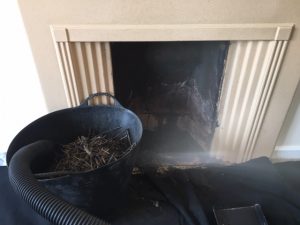 This week I’m continuing with emergency working due to the corona virus pandemic lockdown. This week as in previous weeks recently I have completed a number of urgent jobs for my customers. One notable job was in West Wickam where the customer had complained that he had swarms of bluebottle flies coming out of the chimney and filling the room along with an unpleasant damp smell. He told me that this had begun to happen since the weather had begun to become warm and that he had found and removed a number of twigs and other nest material from the fireplace that had been damp and smelly. To compound these difficulties, he said that the property was a rental property that he was just about to lease to a new tenant and that he didn’t want him moving into a house that was full of flies that potentially presented a hazard to health. I agreed to attend the address the following day and asked him in the meant time to go to the address and observe the chimney for a small time to ascertain whether the nest was active or not, which he agreed to do. I explained to the customer that under the Countryside and Wildlife Act 1981 all birds, their nests and eggs are protected by law and it is thus an offence, with certain exceptions (see Exceptions), to: Intentionally kill, injure or take any wild bird. Intentionally take, damage or destroy the nest of any wild bird while it is in use or being built.
This week I’m continuing with emergency working due to the corona virus pandemic lockdown. This week as in previous weeks recently I have completed a number of urgent jobs for my customers. One notable job was in West Wickam where the customer had complained that he had swarms of bluebottle flies coming out of the chimney and filling the room along with an unpleasant damp smell. He told me that this had begun to happen since the weather had begun to become warm and that he had found and removed a number of twigs and other nest material from the fireplace that had been damp and smelly. To compound these difficulties, he said that the property was a rental property that he was just about to lease to a new tenant and that he didn’t want him moving into a house that was full of flies that potentially presented a hazard to health. I agreed to attend the address the following day and asked him in the meant time to go to the address and observe the chimney for a small time to ascertain whether the nest was active or not, which he agreed to do. I explained to the customer that under the Countryside and Wildlife Act 1981 all birds, their nests and eggs are protected by law and it is thus an offence, with certain exceptions (see Exceptions), to: Intentionally kill, injure or take any wild bird. Intentionally take, damage or destroy the nest of any wild bird while it is in use or being built.
The following day I went to the address where again I spoke with the customer who informed me that he had not seen any birds going to the chimney. I too observed the chimney for a time and saw no bird activity around it. Taken with what the customer had told me about the bluebottle flies and the damp, smelly nest material he had found I determined that the nest was old and redundant and could safely be removed. I did this by using power-sweeping rods (Click Fastening Rods attached to a 36 Volt Cordless drill) and a metal nest flail. I found that the nest occupied the top two meters of the chimney and was relatively quickly removed. I then cleaned the chimney using a power-sweeping scrubber brush. All in all, I removed a large trugs worth of nest material from the chimney (See Photo), this consisted of twigs, decayed bird droppings, fur, bits of carpet, bits of string, and shredded plastic bags. All of this material was damp and rather smelly and had clearly been lying in the chimney redundant for some time – It was not hard to deduce that it was the source of the bluebottle infestation. Needless to say, the customer was very pleased that the nest had been cleared and the source of the bluebottle infestation removed.


 My name is Paddy McKeown, I am a retired police officer (Detective Sergeant – Metropolitan Police), turned chimney sweep. I have completed training with ‘The Guild of Master Chimney Sweeps’, and Rod Tech UK (Power Sweeping).
My name is Paddy McKeown, I am a retired police officer (Detective Sergeant – Metropolitan Police), turned chimney sweep. I have completed training with ‘The Guild of Master Chimney Sweeps’, and Rod Tech UK (Power Sweeping).




Comments are closed.